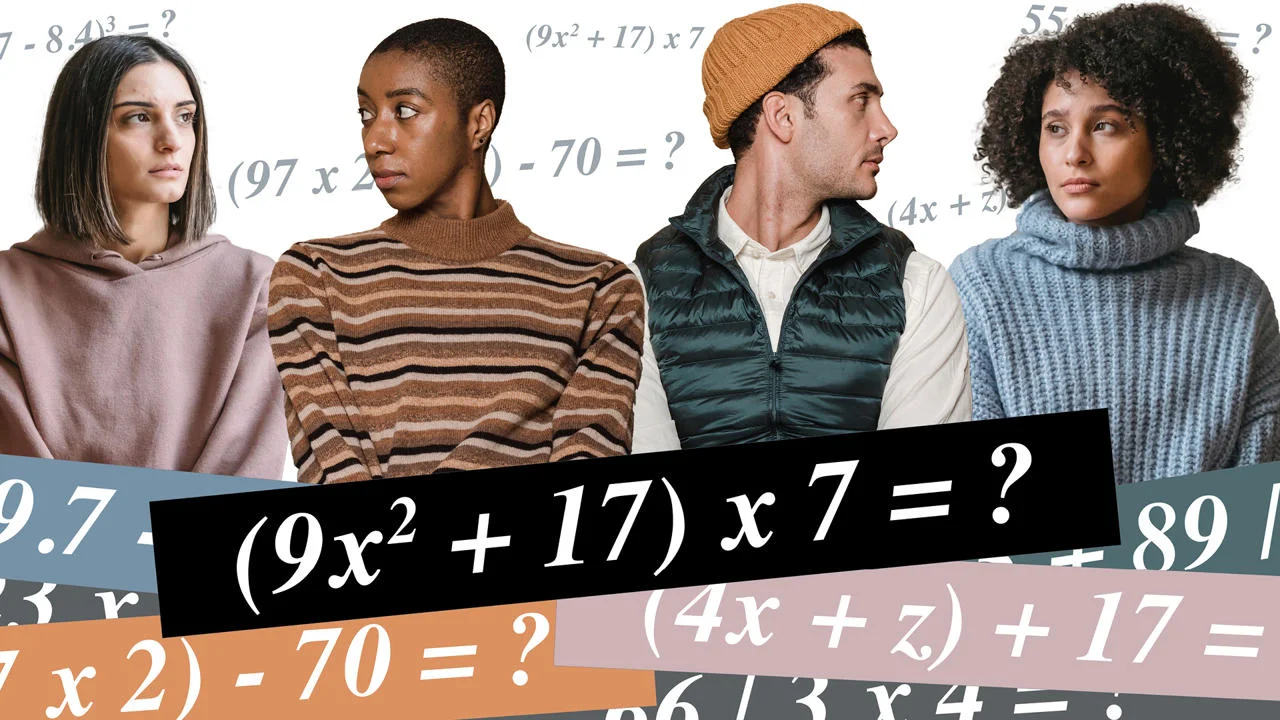How can educators prevent the development of Mathematics Anxiety?

Contents
- Mathematics Anxiety extends far beyond the teaching room
- MA can severely obstruct learning
- Symbolic Interactionism and the self-fulfilling prophecy of Mathematics Anxiety
- Developing new pedagogy: helping teachers change their students' unfavourable narratives about mathematics
- Addressing Mathematics Anxiety within higher education
Mathematics anxiety (MA) is a multifaceted global phenomenon. MA sufferers generally display negative emotions and physiological reactions when asked to perform operations involving mathematical applications, which disrupt their cognitive abilities in both academic and non-academic situations. We now have more than 65 years of MA research that tells us that its ultimate consequence is underperformance or failure.
While many sufferers of MA might assume it is due to them simply being "bad" at maths, MA is not necessarily a reflection of low mathematical abilities - in fact it is also reported by students from robust mathematical backgrounds. The impact of MA can be severe. MA generates a global pattern of students’ avoidance of mathematical applications that is partially responsible for producing STEM (Science, Technology, Engineering and Maths) skills shortages worldwide. This adversely impacts both MA sufferers’ career progression and the global economy, as demand for STEM professionals continues to increase worldwide.
As a result, MA produces a detrimental impact at individual, societal, national, and international levels. Furthermore, data science, statistical skills, and mathematical applications are crucial for today’s global employment market, which is faced with a shortage of these much-in-demand quantitative skills. Considering this, MA is a problem of global interest.
MA sufferers tend to develop unfavourable narratives that extend to everything linked to mathematics.
Mathematics Anxiety extends far beyond the teaching room
MA does not just arise when people are faced with a mathematical problem. My research shows that MA sufferers tend to develop unfavourable narratives that extend to everything linked to mathematics – eg, how they view teachers, interact in teaching rooms, and manage assessments as well as tackle mathematical applications in all contexts. This can create difficulties for MA sufferers as they progress on to university education. Ultimately, this has an adverse influence on MA sufferers’ academic progression, considering that mathematical statistics and research methods courses are core components of almost all degree programmes, and play a central role in university education.
During my PhD study, I investigated if MA is linked to university students’ perceptions of their learning experiences. I aspired to understand if MA sufferers might disregard positive learning experiences and become oblivious to their own success in mathematics because of their negative narratives. My aim was to inquire if MA sufferers could be encouraged to modify these narratives, which could potentially change their attitudes, reactions and behavioural patterns in situations requiring them to use mathematical applications. This entailed persuading students to alter their negative narratives, which called for effective communication, dialogue, and interaction.
To explore these questions, part of my PhD research at the University of Cambridge focused on LSE undergraduate students who were taking statistics courses. The pedagogical intervention underpinned by an overarching framework developed during this research was empirically tested with these undergraduates. My findings showed that the methods I suggest help both to reduce anxiety on average and promote inclusion.
MA can severely obstruct learning
My multi-mixed methods research provides insights into the three key intermediate consequences of MA that are particularly relevant to teachers, and if these are addressed in a timely manner, it could help educators intercept the process of MA before it leads to its ultimate outcome - underperformance or failure.
The first key intermediate consequence is disruption to working memory and attention because of intrusive thoughts linked to mathematics. Second, MA sufferers are unable to ask questions and seek help with their difficulties. Both these consequences obstruct learning, and make students feel despondent and anxious about their unresolved queries. Third, students miss lectures and coursework submissions because of gaps in their understanding of course content. This forms a vicious circle that ultimately leads to underperformance or failure, even for highly able students.
It may be possible to break this vicious circle by abandoning old beliefs, questioning assumptions, and acknowledging new favourable experiences.
Symbolic Interactionism and the self-fulfilling prophecy of Mathematics Anxiety
The theory of Symbolic Interactionism (SI), which emerged from seminal works of sociologists and psychologists, states that individuals’ reactions to situations they encounter, are determined by the meanings they ascribe to these situations. These ascriptions are derived from their past experiences and are constantly being modified through interaction with situations and individuals. Both language and non-verbal communication - eg, eye contact and facial expressions - play critical roles in these interactions.
Despite being a prominent theory, SI has not been used to research MA thus far, which is my main contribution to the field. SI has underpinned both my research and the pedagogical intervention I designed to support MA sufferers.
From a Symbolic Interactionist’s angle, students’ interpretations of their learning experiences of mathematics are influenced by their interactions with teachers and fellow students. Unfavourable interactions, whether these are perceived or real, trigger negative emotions linked to mathematics, leading to negative attitudes to mathematics that eventually develop into MA. Furthermore, MA sufferers’ negative beliefs in their mathematical abilities evolve during these interactions, leading to unfavourable narratives about mathematics.
These beliefs are often unfounded, and yet they adversely influence students’ behaviour and mathematics performance, resulting in self-fulfilling prophecy. As a result, I argue that SI may present a potential solution to MA - that it may be possible to break this vicious circle by abandoning old beliefs, questioning assumptions, and acknowledging new favourable experiences – hence my research focuses on MA sufferers’ unfavourable interpretations, and how these could be changed.
Developing new pedagogy: helping teachers change their students' unfavourable narratives about mathematics
All elements of the pedagogic intervention I developed during this research are designed to promote interaction, inclusion, and collaboration. Academics who face students and maintain eye contact with them, while teaching quantitative courses are generally more tuned in with students. They are better able to Identify cues conveyed by students’ non-verbal communication, which enables them to take timely and appropriate action when students look worried, confused, or distracted.
More importantly, positive, interactive, and constructive feedback is recommended to encourage students’ active engagement and participation. Highlighting students’ progress and complimenting them for their performance can contribute to making them aware of their unexplored mathematical abilities. These simple and easy steps should help guide MA sufferers away from their unfavourable narratives about mathematical applications in quantitative courses and persuade them to reconsider their beliefs about mathematics.
Addressing Mathematics Anxiety within higher education
My study puts forward an innovative overarching theoretical framework of SI for future MA researchers. Its feedback model shows the potential of being developed into an exemplar that could address the ongoing international dissatisfaction with feedback in higher education, particularly in the mathematics education field.
MA can adversely impact both individuals and wider society, but my findings show that it does not have to result in a self-fulfilling prophecy, and that with new educational techniques and insights, MA can be moderated before it makes a significant impact. This research shows some evidence in support of the hypothesis that MA is triggered by students’ interpretations of their learning experiences, which calls for further investigation. While the inclusion of participants according to gender and nationalities allowed for some diversity in perspectives, this study being restricted to one university limits the generalisability of results. My aspiration now is to build on my findings, collaborate with other universities and extend my research by inviting student participants from more diverse backgrounds.
Download a PDF version of this article




